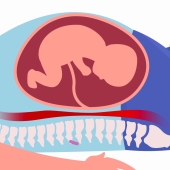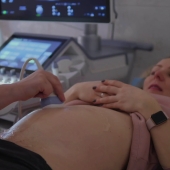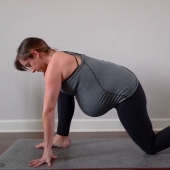Labor is as much a psychological process as a physical one, so relax, create an air of calm, be prepared and informed. Remember that labor is a normal process it is a journey that can take a long time and all labors are different. Even if you labored before. The onset and duration of labor varies widely from one woman to another, first stage can be divided into two phases. The latent phase and the active phase of birthing.
Prior to labor starting, the cervix is long and firm. During the latent phase the muscles of the uterus or womb contract and make the cervix shorter thinner and softer. This occurs before the cervix begins to dilate or open in women that are having their first baby. Feel your nose is firm and muscular. Now feel your lip, it is soft and stretchy. The cervix also moves forward to an anterior position in the pelvis and then gradually dilates.
The latent phase is slow and steady. It can take from 12 hours to 3 days, whether it is often considerably shorter for second or subsequent babies. You may have backache or period type timings which are uncomfortable but not painful for some hours, which may then fizzle out completely. This is normal and it's just your body's way of preparing itself for labor.
Some women have bouncing contractions lasting a few hours which then stop and start up again the next day. This is normal. Your contractions may be irregular in strength and/or frequency. They tend to be variable and more than five minutes apart. Some women will have more frequent contractions during this phase. They still tend to be mild and lasts less than a minute.
So most women contractions in this early phase will not be as strong as they will be in established later. You will probably find that you can still talk through your contraction and potter around the house. Your contractions usually become more regular, intense and painful than the earlier. So called braxton-hicks contractions you may have felt during your pregnancy.
Sometimes contractions in the latent phase can be quite painful, so they may be dilating your cervix much more slowly than you would like. If this happens do not worry each woman has their own rhythm and pace of labour. Some women may not even be aware of these early contractions and they proceed directly the established stage of labour. You may or may not pass a show, the mucousy plug from the cervix.
A show could sometimes has a streak of blood within it. If the blood loss is more than the streak or you are concerned about the amount you should contact your Midwife or the hospital for advice immediately. There are a few reasons to call us if you're worried about anything especially your baby's movement or if you think your water has broken. Your water can break either before during or after you go into labor or occasionally not at all. It might be when you're tightening contractions or surges that are coming on a regular basis.
For example every two or three minutes or three to four in a 10 minute space and when they are lasting a good minute and they are intense and powerful making you need to concentrate on breathing through them. If in doubt please call us when you call please have your Hospital notes nearby. We will ask to speak to you rather than a partner as this enables us to assess how you're coping.
Your name and hospital number how many babies you had before, how many weeks pregnant you are, if you've had any complications in this pregnancy, the frequency of your baby's movements at this time will either suggest that you stay at home for a while longer or we can invite you in for assessment. You're planning a home birth the midwife may contact you to discuss what happens next.
Assessments in early labor include asking you how you feel taking your blood pressure, temperature, pulse and testing your urine. We feel your tummy to check the position of your baby and listen to the baby's heartbeat. We may offer you an internal examination to assess what is happening to your cervix and establish how labor is progressing.
If you are in the latent phase of labor we will suggest you return home to rest and relax, because this is the best place for you to be at this time. If your labor has progressed into the active phase or if we have any concerns we will invite you to stay.
If you are being assessed because your waters are broken as part of the assessment, we will look at the maternity pad you've been wearing. We may also perform a speculum examination to check inside your vagina for leaking waters. If your water to have broken depending on the circumstances, we'll make an appropriate plan with you.
When you enter the active phase of labor also described as established labor. Your uterine activity becomes regular, more powerful and intense. This combined with the pressure of the baby helps the cervix that opened or dilate completely.
Moving around or mobilization is really beneficial in the active phase as it encourages labor to progress more effectively. Relaxation, hypno birthing, supportive birth partner massage, mobility, aromatherapy, water, Entenox known as gas and air opioid injection, epidural.
- 6722 views













